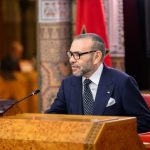جريدة أرض بلادي -هيئة التحرير-
تشكل الهجرة غير النظامية واحدة من أكثر القضايا الإنسانية تعقيدًا في العصر الحديث، إذ تجمع بين الأبعاد الاقتصادية، السياسية، والاجتماعية. إنها رحلة محفوفة بالمخاطر تبدأ من أوطان الفقر والحروب، لتتحول إلى مغامرة يائسة عبر أمواج البحر، ثم إلى معركة للبقاء على قيد الحياة عند الوصول إلى شواطئ الدول الأوروبية.
في الأيام الأخيرة، ظهرت صور مؤلمة توثق اللحظات التي وصل فيها مجموعة من المهاجرين إلى الشواطئ الإسبانية، محملين بآمال جديدة وحلم بحياة كريمة بعيدًا عن معاناة الوطن الأم. لكن الواقع كان أكثر قسوة مما تصوروه. في إحدى هذه الصور، نرى مشهدًا عاديًا يتكرر في شواطئ جنوب أوروبا: مجموعة من المهاجرين يصلون منهكين إلى الساحل بعد رحلة بحرية طويلة، وأمامهم ينتظرهم رجال الأمن الإسبانيون.
إحدى هذه الصور تظهر استخدام رجال الأمن لصاعق كهربائي ضد مهاجر بدا أنه منهك جسديًا بعد رحلة طويلة ومرهقة عبر البحر. لم يكن في استطاعته تقديم أي مقاومة، لكنه وجد نفسه في مواجهة مع صاعق كهربائي، ليبدأ فصل آخر من المعاناة بعد أن ظن أنه نجا من خطر الموت في البحر.

إن هذا النوع من التعامل مع المهاجرين يطرح العديد من التساؤلات حول كيفية احترام حقوق الإنسان في ظل إجراءات أمنية صارمة. صحيح أن كل دولة لها الحق في حماية حدودها وضمان أمنها، ولكن هل يمكن تبرير استخدام العنف ضد أشخاص قد يكونون ضحايا ظروف قاهرة دفعتهم إلى هذا المصير؟
من الواضح أن التعامل مع قضية الهجرة غير النظامية يتطلب أكثر من مجرد إجراءات أمنية. يجب أن يشمل الحوار الدولي آليات حماية حقوق الإنسان، وفتح قنوات قانونية وآمنة للهجرة، إضافة إلى تقديم الدعم للدول التي تستقبل المهاجرين. لكن الأهم هو العمل على معالجة الجذور العميقة لهذه الظاهرة من خلال تحسين الظروف المعيشية في دول المصدر، ومحاربة الفقر والتهميش، وتعزيز التنمية الاقتصادية.
إن مشاهد الصعق الكهربائي التي شهدناها على الشواطئ الإسبانية تضعنا أمام مسؤولية أخلاقية وإنسانية كبيرة. إنها دعوة لتذكير الجميع بأن المهاجرين ليسوا مجرد أرقام في إحصائيات الهجرة، بل هم بشر يملكون قصصًا وأحلامًا وأحقية في أن يُعاملوا بكرامة.
ختامًا، فإن التعامل مع قضية الهجرة غير النظامية يجب أن يتجاوز الإجراءات القمعية إلى تبني استراتيجيات شاملة ومتكاملة تضع الإنسان في قلب كل الحلول، وتضمن احترام حقوقه الأساسية.
** The Plight of Irregular Migrants: From Ocean Waves to Electric Shocks on Spanish Shores**
Irregular migration remains one of the most complex humanitarian issues of our time, intertwining economic, political, and social dimensions. It is a perilous journey that begins in lands of poverty and conflict, transforms into a desperate adventure across treacherous seas, and culminates in a struggle for survival upon arrival on European shores.
Recently, heartbreaking images have surfaced, documenting the moments when a group of migrants arrived on the Spanish coast, burdened with new hopes and dreams of a dignified life far from the suffering of their homeland. However, the reality they encountered was harsher than they could have imagined. In one of these images, we see a scene that has become all too common on the shores of southern Europe: a group of exhausted migrants arriving at the coast after a long and perilous sea journey, met by Spanish security forces.
One of the more distressing images shows Spanish officers using a stun gun on a migrant who appeared physically drained after his long and arduous journey across the sea. Unable to offer any resistance, he found himself confronted by an electric shock, marking the beginning of yet another chapter of suffering, just when he thought he had escaped the dangers of the ocean.
This kind of treatment raises serious questions about how human rights are respected in the face of stringent security measures. While it is true that every country has the right to protect its borders and ensure its security, can the use of violence against individuals who are often victims of desperate circumstances be justified?
It is clear that addressing irregular migration requires more than just security measures. International dialogue must include mechanisms for protecting human rights, opening legal and safe migration channels, and providing support to countries receiving migrants. But most importantly, we must work to address the deep-rooted causes of this phenomenon by improving living conditions in source countries, combating poverty and marginalization, and promoting economic development.
The images of electric shocks on Spanish shores remind us of our significant moral and humanitarian responsibilities. They serve as a call to remember that migrants are not just numbers in migration statistics, but human beings with stories, dreams, and a right to be treated with dignity.
In conclusion, dealing with irregular migration must go beyond repressive measures and involve adopting comprehensive and integrated strategies that place human beings at the heart of all solutions, ensuring the protection of their fundamental rights.









